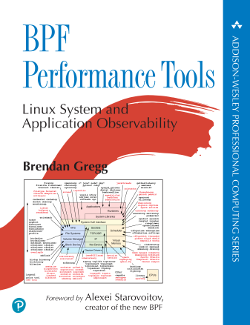bpftrace Cheat Sheet
This page is a bpftrace cheat sheet that you can print out for reference, and is from the bpftrace programming section of my eBPF Tools page. There is another bpftrace cheat sheet as Appendix B in BPF Performance Tools: Linux System and Application Observability.
Syntax
probe[,probe,...] /filter/ { action }
The probe specifies what events to instrument, the filter is optional and can filter down the events based on a boolean expression, and the action is the mini program that runs.
Here's hello world:
# bpftrace -e 'BEGIN { printf("Hello eBPF!\n"); }'
The probe is BEGIN, a special probe that runs at the beginning of the program (like awk). There's no filter. The action is a printf() statement.
Now a real example:
# bpftrace -e 'kretprobe:vfs_read /pid == 181/ { @bytes = hist(retval); }'
This uses a kretprobe to instrument the return of the sys_read() kernel function. If the PID is 181, a special map variable @bytes is populated with a log2 histogram function with the return value retval of sys_read(). This produces a histogram of the returned read size for PID 181. Is your app doing lots of 1 byte reads? Maybe that can be optimized.
Probe Types
These are libraries of probes which are related. The currently supported types are (more will be added):
| Alias | Type | Description |
|---|---|---|
| t | tracepoint | Kernel static instrumentation points |
| U | usdt | User-level statically defined tracing |
| k | kprobe | Kernel dynamic function instrumentation (standard) |
| kr | kretprobe | Kernel dynamic function return instrumentation (standard) |
| f | kfunc | Kernel dynamic function instrumentation (BPF based) |
| fr | kretfunc | Kernel dynamic function return instrumentation (BPF based) |
| u | uprobe | User-level dynamic function instrumentation |
| ur | uretprobe | User-level dynamic function return instrumentation |
| s | software | Kernel software-based events |
| h | hardware | Hardware counter-based instrumentation |
| w | watchpoint | Memory watchpoint events |
| p | profile | Timed sampling across all CPUs |
| i | interval | Timed reporting (from one CPU) |
| iter | Iterator tracing over kernel objects | |
| BEGIN | Start of bpftrace | |
| END | End of bpftrace |
Dynamic instrumentation lets you trace any software function in a running binary without restarting it. However, the functions it exposes are not considered a stable API, as they can change from one software version to another, breaking the bpftrace tools you develop. Try to use the static probe types wherever possible, as they are usually best effort stable.
Variable Types
| Variable | Description |
|---|---|
| @name | global |
| @name[key] | hash |
| @name[tid] | thread-local |
| $name | scratch |
Variables with a '@' prefix use BPF maps, which can behave like associative arrays. They can be populated in one of two ways:
- variable assignment: @name = x;
- function assignment: @name = hist(x);
There are various map-populating functions as builtins that provide quick ways to summarize data.
Builtin Variables
| Variable | Description |
|---|---|
| pid | Process ID |
| tid | Thread ID |
| uid | User ID |
| username | Username |
| comm | Process or command name |
| curtask | Current task_struct as a u64 |
| nsecs | Current time in nanoseconds |
| elapsed | Time in nanoseconds since bpftrace start |
| kstack | Kernel stack trace |
| ustack | User-level stack trace |
| arg0...argN | Function arguments |
| args | Tracepoint arguments |
| retval | Function return value |
| func | Function name |
| probe | Full probe name |
| $1...$N | Positional parameters |
| cgroup | Default cgroup v2 ID |
Builtin Functions
| Function | Description |
|---|---|
| printf("...") | Print formatted string |
| time("...") | Print formatted time |
| join(char *arr[]) | Join array of strings with a space |
| str(char *s [, int length]) | Return string from s pointer |
| buf(void *p [, int length]) | Return a hexadecimal string from p pointer |
| strncmp(char *s1, char *s2, int length) | Compares two strings up to length |
| sizeof(expression) | Returns the size of the expression |
| kstack([limit]) | Kernel stack trace up to limit frames |
| ustack([limit]) | User-level stack trace up to limit frames |
| ksym(void *p) | Resolve kernel address to symbol |
| usym(void *p) | Resolve user-space address to symbol |
| kaddr(char *name) | Resolve kernel symbol name to address |
| uaddr(char *name) | Resolve user-space symbol name to address |
| ntop([int af,]int|char[4:16] addr) | Convert IP address data to text |
| reg(char *name) | Return register value |
| cgroupid(char *path) | Return cgroupid for /sys/fs/cgroup/... path |
| time("...") | Print formatted time |
| system("...") | Run shell command |
| cat(char *filename) | Print file content |
| signal(char[] sig | int sig) | Send a signal to the current task |
| override(u64 rc) | Override a kernel function return value |
| exit() | Exits bpftrace |
| @ = count() | Count events |
| @ = sum(x) | Sum the value |
| @ = hist(x) | Power-of-2 histogram for x |
| @ = lhist(x, min, max, step) | Linear histogram for x |
| @ = min(x) | Record the minimum value seen |
| @ = max(x) | Record the maximum value seen |
| @ = stats(x) | Return the count, average, and total for this value |
| delete(@x[key]) | Delete the map element |
| clear(@x) | Delete all keys from the map |
There are additional lesser-used functions and capabilities not summarized here. See the bpftrace Reference Guide.
